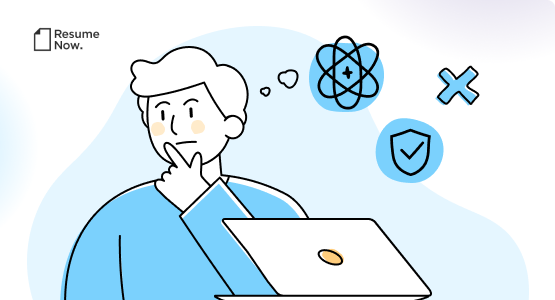In the fast-paced world of eCommerce, your savvy approach to online sales has been the engine of success for various digital storefronts.
But when the spotlight turns to your abilities and dedication to potential employers or partners, how do you put your expertise into words that sell you as the perfect fit for the role?
Luckily, here you’ll find the steps to take for ending up with a resume that gets you the role you want.
This guide will empower you with:
- Prime examples of top-tier eCommerce resumes.
- Insights into creating an eCommerce resume that cuts through the clutter.
- Tailored resumes for every level, from new entrants to eCommerce veterans.
- The undeniable value of a cover letter in showcasing your personal brand.
- Key takeaways to arm yourself with before sending your resume.
Eager to start refining your resume? Use our Resume Maker. Opt for a template that speaks to the eCommerce industry’s vibe and make the most of niche-specific tips, complete with customizable text suggestions.
Popular eCommerce resumes
Before you learn how to write a resume that sells you as the top candidate, you might want to know what a good eCommerce resume looks like.
Let’s check out a couple of excellent examples to help you get started:
Are you looking for a different job title? We have many others in the digital marketing domain:
How to write an eCommerce resume
Get ready for a stellar eCommerce career by writing a resume that captures your digital skills, section by section.
First, you need a resume outline. Here’s what yours should include:
- Prominent contact information near the top.
- An engaging resume profile.
- Skills section tailored to eCommerce.
- Professional experience in reverse-chronological order.
- Education credentials, certifications and additional training.
- Supplemental sections to highlight your competencies, like languages and volunteer work.
Alright, let’s discuss each part.
Step 1
Add your contact info
For an eCommerce role, make your resume the ideal storefront for your professional skills — clear, accessible and inviting for any hiring manager who comes across it.
Here’s what to include up top:
- Your name: Let it stand out as the brand that you are.
- Phone number: The direct line for recruiters to say ‘hello.’
- Email address: Keep it professional; this is your digital handshake.
- Location: City and state, grounding your digital expertise in a real-world location.
If you have an online portfolio that showcases your best work, add a link to it here.
Your resume’s design should mirror the clean and intuitive interfaces of the best e-commerce sites, helping your experience and achievements take center stage without distraction. Now, let’s ensure your introduction is as engaging as the homepage of a top online marketplace.
Step 2
Draw the reader in with your summary
Think of your professional profile as the home page for your career’s brand, setting the stage for your entire resume. Positioned right up front, this is your chance to make a memorable first impression.
Craft your profile so it reads like an exclusive preview of your professional journey — highlighting the skills and experiences that make you the prime candidate for the role. Here’s your strategy to personalize it:
- For the eCommerce veterans — If you have three or more years in the digital marketplace, it’s time for a professional summary. In a few well-chosen sentences, distill your expertise, showcasing the key achievements that make you a heavyweight in the industry.
- For the industry newcomers — Starting your career or shifting from a different sector? A resume objective statement will outline your new direction with clarity. Use this paragraph to explain how your skills align with the company’s needs.
Your goal is to persuade the hiring manager that your skills and experience would make you an asset to their business.
Want to kick it up a notch? Read the company’s mission statement, then use your summary to show you understand their brand by speaking their language and values. This personal touch not only shows you’re fit for the role but it also suggests you’re already part of their world.
Tailor, tailor, tailor. Your resume isn’t one-size-fits-all. Fine-tune your profile to echo the job posting, emphasizing the skills and experiences that hit the mark. This tailored approach will ensure your resume smoothly sails through any applicant tracking systems (ATS).
Summary for a seasoned eCommerce specialist
Expert ecommerce specialist proficient in creating customer-centric online shopping experiences, with a proven history of boosting customer retention and sales figures. Expert in leveraging data analytics to understand consumer behavior and tailor online marketing strategies accordingly. Exceptional at overseeing online inventory management and streamlining order fulfillment processes to maximize customer satisfaction and operational efficiency.
Career objective example for an eCommerce resume
Freshly minted marketing graduate poised to kickstart a dynamic career with Innovatech eCommerce Solutions. Eager to bring analytical prowess and a fresh, data-driven perspective to enhance online presence and drive sales growth for Innovatech’s diverse product lineup. Committed to contributing to team objectives and to upholding the brand’s reputation for outstanding online shopping experiences.
Step 3
List your most ecommerce-relevant skills
You need a well-rounded skill set to land an ecommerce job.
Every day, ecommerce professionals use a combination of hard skills, like navigating online platforms or analyzing customer data, and soft skills, like coordinating with cross-functional teams or engaging with customers.
When adding skills to your resume, don’t pit the two against each other in a cage match — hard skills vs soft skills. Instead, use them both in harmony.
For ecommerce roles, your ability to work with technology and people is equally important. Showcase your knack for doing both by using a range of terms like “manage,” “analyze,” “collaborate,” “assist” and “engage.”
Hard and soft skills for an ecommerce resume
- Proficiency in e-commerce platforms
- Data analysis and interpretation
- SEO/SEM marketing techniques
- Inventory management systems
- Strong customer service
- Teamwork and collaboration
- Effective communication
- Adaptability to change
Step 4
Detail your ecommerce work experience
Ecommerce is a dynamic industry, demands are constantly evolving.
Your work history should showcase this evolution via on-the-job experience, focusing especially on the measurable results of your work.
The bullet points in your experience section should not merely recount your responsibilities but should spotlight the direct impact of your actions on customer satisfaction and business growth.
As you work on this section, consider adding:
- Customer engagement metrics, such as conversion rates or customer retention figures, to demonstrate your impact.
- Initiatives you’ve led, like website optimizations or marketing campaigns that have increased traffic or sales.
- Powerful action verbs like “executed,” “enhanced,” “developed,” and “strategized” to bring energy and clarity to your e-commerce narrative.
Organize your job history in reverse-chronological order to highlight your most timely and pertinent accomplishments.
Ecommerce professionals are well known for their technical skills, but don’t forget about your soft skills. Skills like customer service and collaboration are just as important to the role.
Ecommerce work experience entry example:
E-commerce Manager
Tech Gadgets Online Store | San Diego, CA | May 2019 – Present
- Managed the online storefront, increasing customer engagement by 35% through targeted social media campaigns and personalized email marketing.
- Spearheaded a website redesign project that improved user experience, resulting in a 20% uplift in conversion rates.
- Implemented an SEO strategy that elevated our product pages to top rankings, boosting organic traffic by 40%.
- Fostered a collaborative environment by initiating cross-functional meetings that integrated marketing, sales and customer service efforts, leading to a 15% increase in cross-selling opportunities.
Step 5
Showcase your education and credentials
For those carving out a career in ecommerce, the education section of your resume serves as the foundation of your expertise in digital commerce and business management.
In this segment, you’ll want to list your degrees and relevant certifications to assure employers of your capability to handle the challenges of an ecommerce role.
Organize your educational background like this:
- Postsecondary education, such as a bachelor’s or associate degree in business, marketing, information systems or a related ecommerce field.
- A high school diploma, unless you’ve completed college, in which case you can leave it off.
- Relevant certifications and training, which can be pivotal in e-commerce for staying current with digital trends and technologies.
Pair your education with any certifications or special training you’ve undertaken that relates directly to ecommerce. If you’ve earned any honors or awards, showcase them to underline your commitment to excellence in your profession.
Sample education section for an ecommerce resume:
Education
Bachelor of Arts in Business Administration
Concentration: Digital Marketing
Metro State University, Denver, CO
Graduation Date: May 2021
Certifications
Certified E-commerce Professional (CEP)
eMarketing Association
Certification Date: August 2021
If your GPA is particularly high (3.5 or higher), you may choose to include it. However, in the e-commerce sector, relevant experience, specialized training and certifications are typically more influential than academic performance alone.
Step 6
Add special sections (as needed)
When ecommerce is your entire life or you’ve been moonlighting as an e-commerce wizard outside of your nine-to-five, there’s valuable territory on your resume waiting to be claimed.
Elevate your ecommerce resume with these additional sections that can give you an edge:
- Digital portfolio: Spotlight any e-commerce projects or websites you’ve worked on. Links to online stores you’ve managed or digital marketing campaigns you’ve led can be eye-catching.
- Tech training and certifications: In an industry driven by technology, showing that you’re up to date with the latest e-commerce platforms, digital marketing trends and data analytics tools can be a game-changer.
- Multilingual abilities: If you’re fluent in other languages, that’s a huge plus in global e-commerce, helping bridge the gap in international marketplaces.
- Professional affiliations: Being part of groups like the National Retail Federation or E-commerce Professionals Association shows a proactive approach to networking and professional development.
- Special projects: If you run an e-commerce side gig, blog about digital marketing trends or consult on e-commerce strategies, these are testaments to your dedication and entrepreneurial spirit.
Achievements like “Top Salesperson of the Year” or “Best Digital Campaign Award” from previous roles or industry recognitions shouldn’t be left behind. These accolades speak volumes about your potential.
Remember, the template of your resume should match the ecommerce sector — dynamic, user-friendly and responsive. While creative flair can distinguish you, clarity reigns supreme. Streamlined, modern templates can help organize your resume neatly, making it easy to navigate, much like the best ecommerce sites. Creative resumes do the same but with a little more flair.
You’ll find an array of templates tailored for ecommerce professionals with a quick search online, many of which are available as free downloads for platforms like Microsoft Word or Google Docs.
Before you send your resume, proofreading it isn’t just a final check — it’s critical. A typo might be all it takes for a cart abandonment on your application journey.
Up next, let’s dive into how different resume formats can benefit your e-commerce career search.
resumes made with Resume Now!
Ecommerce resume examples by experience level
At each stage of your ecommerce career, you might want to take a different approach to organizing your resume.
The resume format you choose to present your ecommerce expertise can be as strategic as a well-optimized product page.
Here are the three main types of formats and when to use each of them:
- If you’re a seasoned e-commerce expert, a reverse-chronological resume showcases a robust track record of positions and achievements, underlining your influential presence and impact in the industry.
- E-commerce professionals who are establishing their presence in the market could choose a combination resume. This format allows you to balance your growing list of roles and your expanding toolkit of ecommerce skills.
- For those new to the ecommerce scene, you might consider a skills-focused resume (also known as a functional resume). This format is perfect for highlighting your skills more so than your chronological work history.
Next up, we’ll present visual examples of each resume type, explaining why they shine for professionals at different stages of their ecommerce careers.
Functional resume format: Entry-level ecommerce resume example
Here’s why this resume works:
-
Resume objective is strategic
The functional resume opens with a well-crafted objective, clearly outlining how the candidate intends to apply their existing skills and experience to succeed in an ecommerce role (and add value to the company).
-
Highlights transferable skills
By focusing on relevant competencies and transferable skills, this resume format allows the candidate to draw attention to valuable ecommerce attributes like digital marketing, data analysis and customer relationship management.
-
Certifications are included
This resume smartly emphasizes certifications like Google Analytics and HubSpot Inbound Marketing, showcasing a proactive approach to professional development.
Combination resume format: Midcareer ecommerce resume example
Here’s why this resume works:
-
Shows career progression
The combination resume format highlights the candidate’s upward career trajectory, showcasing their evolution from intern to coordinator to analyst, which illustrates a strong work ethic and a commitment to professional growth.
-
Powerful bullet points
The use of bullet points is executed effectively to not only list key skills but also to demonstrate their impact, such as increasing website traffic. This approach provides tangible evidence of the candidate’s value in real-world scenarios.
-
Prominent skills section
Placing the Skills section at the top of the left-hand column immediately draws attention to the candidate’s abilities, particularly their highly sought-after technical skills like A/B testing.
Chronological resume format: Experienced ecommerce resume example
Here’s why this resume works:
-
Opts for a professional summary
This ecommerce resume effectively kicks off with a professional summary rather than an objective statement. This approach is ideal for seasoned professionals who can concisely highlight career achievements.
-
Quantifiable achievements over job duties
Rather than a bland list of job responsibilities, this resume showcases quantifiable metrics that speak volumes about the candidate’s impact. For example, it details specific increases in customer satisfaction rates and conversion rates.
-
Continued professional development
This applicant strategically included up-to-date certifications, signaling to potential employers that the candidate values ongoing learning and remains abreast of industry developments, which is essential in a sector like e-commerce.
Write an ecommerce cover letter
Making an engaging cover letter can greatly improve your chances of standing out in a competitive job market. It’s that little nudge that can tip the scales in your favor.
Your cover letter is the perfect space to expand on details that your resume may not capture. For instance, if you’re transitioning from a brick-and-mortar background to a digital commerce role, or you’ve taken a sabbatical to upskill in the latest ecommerce technologies, this is the place to tell that story.
Need a boost? You could explore a guide on how to write a cover letter or check out cover letter examples for inspiration. Look for resources that shed light on basic formatting rules.
For those who need to apply in just a few minutes, utilizing our Cover Letter Generator could be a game-changer. This tool offers customizable content suggestions that align with ecommerce responsibilities and can be adjusted to better fit your backstory.
Next, we’ll talk about earning potential.
Facts about the ecommerce industry
Even the most skilled ecommerce professionals can benefit from understanding what lies ahead in their career journey.
Here are the salaries for common ecommerce positions in the U.S.:
- Ecommerce specialists earn an annual median salary of $57,000.
- Ecommerce analysts earn an annual median salary of $78,000.
- Ecommerce sales associates earn an annual median salary of $101,000.
- Heads of ecommerce earn an annual median salary of $233,000.
Key takeaways for your ecommerce resume
-
Demonstrate your customer-centric skills
Ecommerce thrives on customer satisfaction. Your resume should highlight your ability to communicate effectively and manage customer relations.
-
Customize your resume for the job
Scrutinize the job description and shape your resume to underline the skills and experiences that match the job’s specific demands.
-
Showcase your certifications
Certifications can be a testament to your dedication and knowledge in ecommerce platforms, digital marketing or other relevant areas. Make sure these are visible.
-
Highlight measurable successes
Ecommerce is results-driven. Spotlight any significant metrics you’ve improved, like conversion rates, average order value or customer retention rates.
-
Select a format that highlights your strengths
Choose a resume format that best showcases your skills. If you have some experience, a chronological resume is probably the way to go.
-
Ensure accuracy
Mistakes on a resume can be costly. Rigorously edit your resume and have a trusted peer review it for an additional layer of verification.
-
Pair with a persuasive cover letter
A thoughtful cover letter can be a decisive factor, reflecting your passion for ecommerce and your drive to excel in the industry.
Commonly asked questions
Was this information about Ecommerce Resume: Examples, Templates & Tips helpful? Let us know!
Don is a Certified Professional Resume Writer (CPRW) with more than 10 years’ experience creating digital content, including four years helping job seekers develop their careers. He holds an M.S. in Journalism from Northwestern University.
More resources

Side Hustles from Home: Online Jobs, Gigs and More Ideas
From freelancing to dog-walking turn your free time into inco...

11 High-Paying Jobs That Are Less Stressful AND Flexible
Leave your stress behind with a high-paying low-stress work-fr...

AI Compliance Crisis: 57% Concerned About Unclear AI Policies at Work
Resume Now examines growing concerns amongst workers regarding...

Carpenter Resume: Examples, Templates & Tips for 2025
Make a carpenter resume that gets interviews. Use our writing ...

Student Resume: 2025 Examples & Templates
Check out our guide for help writing a job-winning student res...

Sales Planner Resume: Examples, Templates & Tips for 2025
Whether you re an experienced professional or just starting ...
